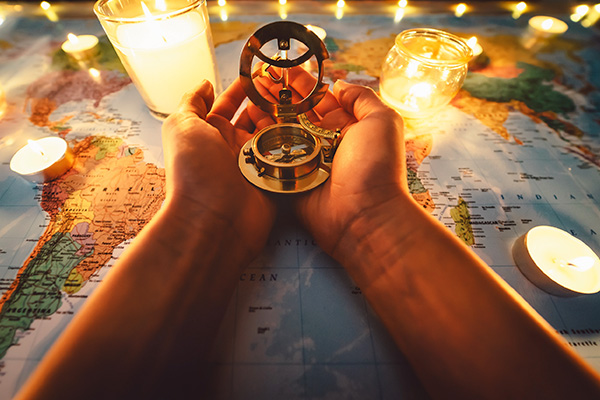Three Steps to Reclaiming Focus: Spirit’s Solution for a Dispersed Mind
 Meditation is my cherished intermission with the universe — it’s where I swap the buzz of messages and tasks for the echoes of the spirit and the calm vibration of existence.
Meditation is my cherished intermission with the universe — it’s where I swap the buzz of messages and tasks for the echoes of the spirit and the calm vibration of existence.
Each meditation session begins with a clear intention. Typically, it involves a question I wish to pose to the spirit. I envision it as dispatching a “text” to the divine, eagerly anticipating the gentle sound of enlightenment.
Today’s intention drew me towards a central puzzle that many guardians, educators, and empathetic souls ponder: What accounts for the apparent surge in Attention-Deficit Hyperactivity Disorder (ADHD) in our culture?
In educational environments, workplaces, and even yoga studios, an increasing number of individuals face challenges with disjointed attention and mental exhaustion. Recent studies imply that our technology-saturated, high-stress lifestyles may be transforming latent attention issues into a widespread epidemic.
I felt driven to inquire, “Could there be more to this narrative than just brain chemistry and pharmaceutical solutions?”
Following an unusually extended session, I surfaced with several pages of notes filled with insights that struck me as both refreshingly simple and deeply insightful.
The first vision that graced my meditation was a glimpse of life before the internet era, a time when smartphones were absent.
I visualized neighbors engaging in friendly conversations on their porches, children cycling freely in the streets until supper time, and evenings illuminated by dialogue rather than glowing screens. The rhythm of life was slower, and individuals’ nervous systems were at ease.
Our innate ability to remain fully present is facing challenges and risks becoming extinct ~ Donald Altman
Then, reminiscent of a hyperactive social media feed, I witnessed a rapid succession of app alerts, nonstop news, and around-the-clock productivity zipping by. From this glaring contrast, three fundamental lifestyle contributors emerged:
✵ Chronic lack of sleep. Our minds can’t reset if our bodies never take a break.
✵ A chaotic mental environment. Most individuals have lost touch with being mindful in silence and connecting with their inner selves.
✵ A sedentary way of living. Our vital energy (breath, circulation, nerve impulses) becomes stagnant as we remain seated all day.
In essence, the physical vessels that harbor our spirits are crying out for the essentials: rest, tranquility, and movement! While medication has its valid role (no shame), the spirit emphasizes the need to restore the innate rhythms embedded in our biology.
Disclaimer: I’m not a medical professional; this does not substitute for qualified medical counsel. However, the straightforward practices suggested by the spirit are free from side effects and hold the potential to enhance your life.
Sleep: Your Nightly Divine Recharge
During sleep, our subconscious minds work through the daily emotional experiences, and the pineal gland produces melatonin — a hormone as enchanting as any elixir. Just one night of restorative sleep can sharpen concentration, enhance learning, and uplift mood. Energetically, sleep is when guides communicate through dreams, and our aura receives a rejuvenating influx of universal life energy.
Consider these straightforward techniques:
Dusk Downtime: As night falls, lower the lights. Replace scrolling with soft melodies, candle meditation, restorative yoga, or a soothing salt bath to guide your mind towards serenity.
Device-Free Sleeping Space: Set alarms not just for waking but also for bedtime. Ensure your room is cool, dark, and free of electronics; your dreams are entitled to a peaceful mental sanctuary.
Moonstone Ceremony: Utilize moonstones to enhance dream recollection and astral visions. Tuck a moonstone beneath your pillow, say “Reveal what restores me,” and jot down insights at dawn in a dream journal. Moonstone’s silvery aura makes it an ideal bedside companion. Over time, dream snippets surface like shells on a beach, uncovering messages, premonitions, and spiritual symbols.
Dream Record: Drift off to sleep with a specific intention: “May tonight’s slumber renew my spirit and unveil gentle insights.” Keep a notebook (not on your phone) handy; upon waking, record the first thoughts or images that come to mind. Gradually, these dream fragments weave a personalized oracle, conveying messages that might be overlooked in daylight.
Morning Tech-Free Time: Bestow your mind at least 30 tranquil, device-free minutes after rising. Sip water, observe the natural light, breathe deeply. Allow your nervous system to ascend gently before reaching for that gadget.
Prayer Bookends: My go-to practice is to start and conclude each day with sincere prayer. In the morning, place a hand over your heart, breathe deeply, and express gratitude for a new dawn: “May I move forward with clarity and kindness today.” At night, after dimming the lights, either sit or kneel, releasing the day’s burden with an exhale and offering a final blessing: “I release what no longer serves me. May peace embrace my dreams.” These brief intentions will give purpose to your waking hours and assist you in drifting off with serenity, reminding your spirit that every moment is graced by something greater.
The issue is that continually acting, without ever tuning into the core of our existence, is akin to fueling a grand vessel by tossing its navigational tools into the furnace ~ Martha Beck
Meditation: Aligning Your Inner Frequency
A restless mind resembles a device endlessly scanning for Wi-Fi, never connecting to a single network long enough to absorb any insights. Meditation teaches us to hone into the soul’s signal where intuition flows freely. A few minutes of mindfulness daily can toggle the parasympathetic “reset” switch, lower cortisol levels, and enhance your focus.
Try these uncomplicated techniques:
Cherished Solitude: Claim brief moments of solitude. A sunrise walk or ten deep breaths behind a closed door. In the silence, let your thoughts settle like snowflakes in a globe; what matters will rise, and your internal compass will reset to true north.
Single-Task Affirmation: Before starting any task, softly utter, “This one task at a time,” take a deliberate breath, and proceed. After completing it, let out an exhale, smile, and transition to the next.
Three-Breath Recalibration: If stress escalates, inhale for four counts, hold for four, and exhale for six. Repeat three times, visualizing cloudy thoughts disappearing like early morning mist.
Midday Cache Cleanup: Schedule a phone alert labeled “Breathe.” Close your eyes and take three leisurely inhales and three slow exhales — just thirty seconds is all it takes!
Prevent Energy Drain: Pay attention to how your body feels after interactions: light and uplifted, or weighed down and unclear? Where heaviness persists, maintain graceful distance from those energies: fewer messages, shorter interactions, a courteous “no.” In extreme circumstances, consider complete “no contact.” Envision a gentle, radiant boundary around you; only those who honor its light may come closer. Weekly, list people, places, or habits that drain your energy. Consciously choose one to minimize this week. Each “no” to depleting energy is a “yes” to psychic vitality!
Movement: Transforming Energy Through Action
We are not mere brains on sticks. Movement infuses oxygen into our frontal lobes, releases feel-good endorphins, and clears stagnant energy from our aura. A refreshing walk outdoors is a dynamic form of prayer.
Consider these simple strategies:
Hourly Stretch & Water: Every 50 to 60 minutes, stand, roll your shoulders, drink water, and gaze at greenery. Just two minutes revitalizes focus and energy.
Nature Connection: Step outside daily, barefoot if you’re able. Feel the earth, listen for birds, allow your nervous system to attune to the earth’s slower pace.
Nutrition as Energy, Not Muddiness: Build meals around vibrant vegetables and quality protein; view sweets as mindful indulgences instead of go-to snacks. Pause to express gratitude before the first bite.
Affirmation Walk: Combine your daily walk with the affirmation, “With each step, I anchor myself in love and light,” syncing your pace with the heartbeat of Gaia.
Honor your need for rest, quietude, and movement. By doing so, you’ll calm your wandering mind, elevate your soul’s frequency, and let the gentle vibration of universal love and light guide your every step.
|
Moon Goddess is a third-generation empathic healer and oracle. Over two decades ago, she began offering healing readings. Her lifelong passion for metaphysical studies has shaped her deep insights. As a highly sensitive individual, she perceives and foresees events before they unfold. By utilizing Tarot and guidance from her higher self, she supports individuals worldwide. After her grandfather’s passing, he honored his promise to return and provided her with a remarkable experience. Moon is convinced of the existence of a wondrous Heaven! Sharing her insights has been invaluable for those grieving or dealing with loss. Experience a reading with Moon Goddess today at PsychicAccess.com. |
In our contemporary, fast-paced society, it can feel daunting and chaotic. With ceaseless distractions and continual obligations, maintaining focus and clarity often becomes a struggle. Regaining focus is crucial for creativity, productivity, and overall wellness. One impactful method to achieve this is through spirituality. By connecting with your spirit and aligning with your higher purpose, clarity and serenity can emerge amidst the surrounding chaos of daily life. Here are three steps to help you regain focus and attain spiritual healing for a distracted mind.
Step 1: Connect with your spirit
The first step in regaining focus is forging a connection with your spirit. Engage in meditation, prayer, or any practice that allows you to quiet your mind and attune to your inner essence. Taking the time to reach out to your spirit can draw upon a reservoir of wisdom and guidance that will aid you in navigating life’s challenges. This connection offers grounding and clarity, ensuring you remain focused and centered amidst the tumult.
Step 2: Align with your higher purpose
After establishing a connection with your spirit, the subsequent step is aligning with your higher purpose. This requires identifying your core values and intentions that resonate with what holds true significance for you. By centering on your higher purpose, you become more motivated and inspired to stay the course, resisting distractions from the external noise and pressures. When you possess clarity regarding your purpose and endeavor to live in accordance with it, regaining focus becomes attainable, even when faced with trials and difficulties.
Step 3: Cultivate mindfulness and presence
The final step to regaining focus entails nurturing mindfulness and presence. This means being entirely engaged in the moment and observing your surroundings without judgment or attachment. By fostering a sense of mindfulness and presence, you’re training your mind to stay focused, steering clear of distractions and anxiety. This practice helps maintain tranquility and clarity throughout your day, regardless of external chaos.
In closing, reclaiming focus in our fast-paced world may pose a challenge, but through connecting with your spirit, aligning with your higher purpose, and cultivating mindfulness and presence, you can find spiritual restoration for an unfocused mind. By dedicating time to nourish your spirit and aligning with your purpose, achieving focus and clarity becomes realistic, allowing you to navigate the turbulence of everyday life with grace and serenity. Continue reading
















